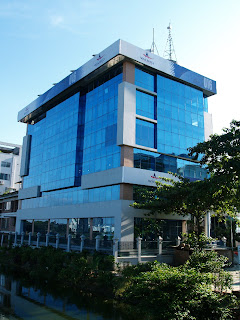The situation for flood-affected people in Bangladesh continues to deteriorate even as flood waters receded. Up to 10 million people have been displaced across Bangladesh by the flood waters, and are living on embankments and roadsides in temporary, flimsy shelters. The floods have covered over half the country and in some places are the worst seen in sixty years. Many have died, and diarrhoea, dysentery and other water borne diseases are beginning to spread. In many areas, access is only possible by boat.
The long-term effects of this flooding are only just beginning to materialise. Not only have people seen all their possessions washed away by the floodwaters, but they know that under these new brown seas lie the remnants of this year’s rice crop. North Bengal, the area most badly affected (taking in the districts of Sirajangj, Kurigram, Rangpur and Gaibunda) is also the poorest part of Bangladesh. The only economic activity here is agriculture. Most of the land is owned by a handful of zaimanders, who employ the rest of the population as day labourers in the paddy fields. They can plant three crops a year in most parts of the north. The second was due for harvest around now. That has been ruined by the flood.
In normal years, the fields are harvested and then prepared for the next planting in late August and September. After transplanting the Aman rice crop in late September, the agricultural labourers face unemployment for up to two months as they wait for the crop to ripen and harvesting to begin in December. This has lead to the annual occurrence of Monga – a local, near famine condition – every year for centuries. Labourers have had to sell household possessions or their labour in advance at discounted rates to survive, whilst some move to Dhaka to ride rickshaws and others take small loans at extortionate rates. Many starve and malnutrition, particularly amongst the young and women is very high.
This is what happens in a normal year: indeed, this is something that local people try to plan for and which the World Food Programme and others have activities for to try to mitigate its effects. Yet this year, there will not be any field preparation and planting, meaning people will miss two further employment opportunities; this, and the subsequent harvest. This all adds up to an extremely desperate situation that people are facing in the long term, let alone the daily struggle to keep healthy, clean and safe in 4 or 5 feet of dirty, polluted flood water.
The scale of the emergency seems to have been downplayed by the government, and has not received the sort of coverage in the Western press that such an event deserves. This is mainly due to the slow-onset nature of flood disasters, with their protracted development that is less dramatic than the immediacy of earthquakes and tsunamis, which make much better infotainment. But whilst relatively few have died in the flooding, the after effects look set to be dramatic and disheartening.
INGOs and donors are working through local partners to distribute relief aid, but access is difficult and distribution slow. Clean water and shelter are the main requirements at the moment, as many tube wells have become contaminated by the flooding. Capitalism is making its effect known too: the price of water purifiers has doubled in Bangladesh, making them out of the reach (physically as well as economically) of those that really need them.

There is a desperate need for aid, and as a major INGO making a development contribution, VSO Bangladesh feels compelled to make a contribution. The north of Bangladesh is one of VSO’s strategic working areas and some volunteers living there have been flooded out of their homes, and witnessed some very distressing scenes VSO is not a relief organisation and would not pretend to be, but we do have the benefit of many volunteers with their own networks. Therefore, we are asking you, if you can, to donate a small amount to the VSO Bangladesh flood relief fund. All the money will be given to the Chief Advisor’s Special Relief Fund, which is where DFID and other organisations are channelling their relief support.
VSOB is only asking for donations for this one week, so that we can release the money quickly. If you feel inclined, please click on the link here, where you can donate through Paypal via our IT volunteer Mikey Leung’s account.
I have had limited water supply, infrequent power, knee deep filthy flooding and overflowing sewers where I live, so I can vouch for how the television screens do not capture the stench of the water, or the feel of sewage washing through your toes, or the bites of insects in the water on your calf. Yet I have not had my shack and all my possessions washed away, nor can I not access medical treatment, and I can buy a flight home if it gets too bad. The people of North Bengal are in dire need and face a very miserable and hard time over the next few months. If you can help in a small way, VSO Bangladesh, its staff and volunteers, will be very grateful. The money will be spent by Bangladeshis with the skills and experience in disaster relief, and will be put to good use, and not spent on campaign costs or publications.
Please click here to make a contribution.








